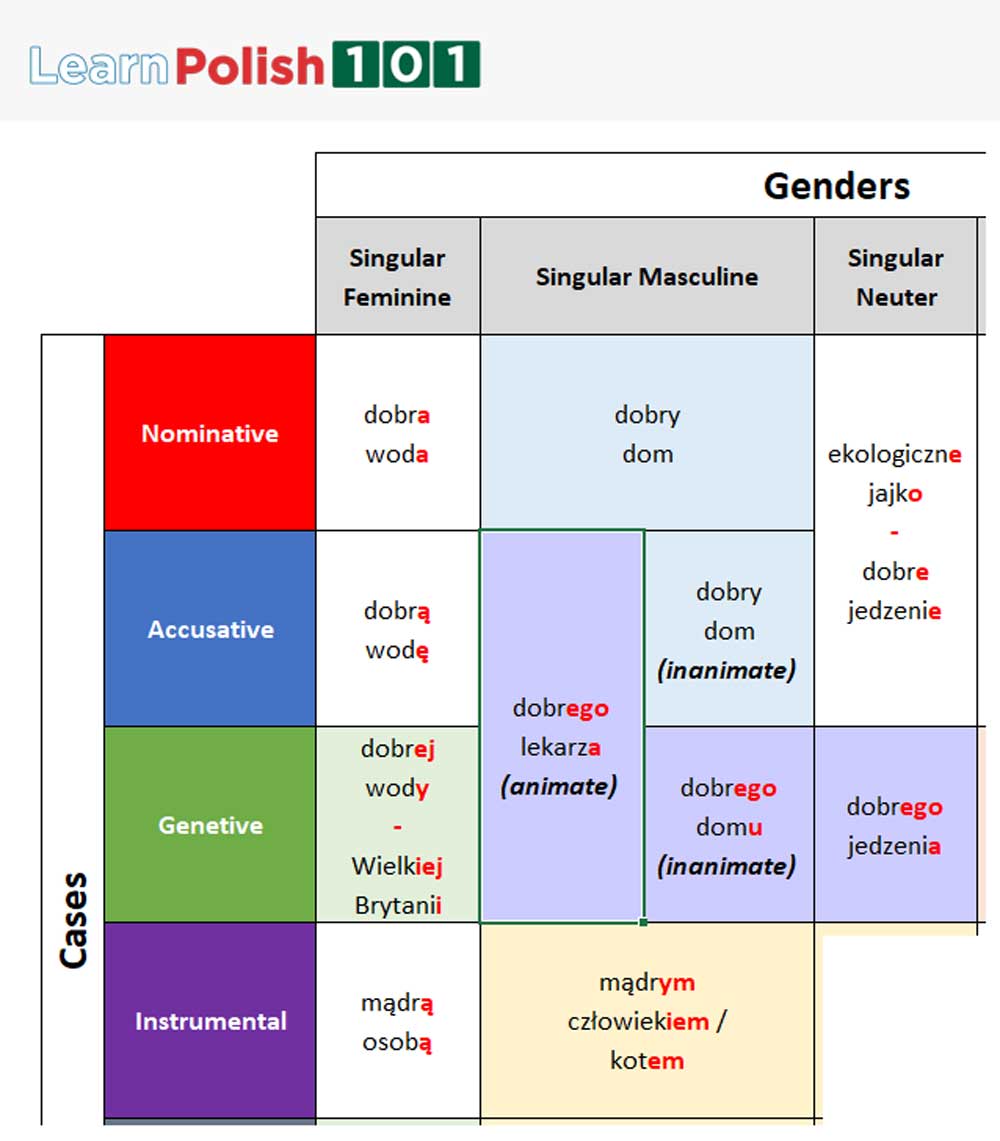Polish Grammar - Instrumental Case - Masculine
As we saw in the last lesson we end up in the Instrumental case when we are describing who someone is - a woman, a doctor, etc. Here we'll see how masculine nouns change in the Instrumental

In the Instrumental case we make the following changes if the noun is masculine
- Adjective ending - add 'm' - dobry -> dobrym
- Noun ending - add 'em' - lekarz -> lekarzem
- A good (male) doctor - Dobry lekarz
- He is a good doctor - On jest dobrym lekarzem
So how would you say:
- I am the new (male) doctor -
- He is not the new doctor -
- Are you the new (male) doctor? -

The mental hook here is the 'm'. Both the adjective and the noun end in the 'm' we see in the middle of Instrumental
We can also see from the previous lesson that adjective and noun endings match for both feminine and masculine nouns so this is the matching case.
- A person / a human - Człowiek
Where the noun ends in a hard letter like 'k' we soften the ending by adding 'iem' instead of 'em'
- You are a clever person - Jesteś mądrym człowiekiem
We will see this 'softening' by using 'i' happening in many other places so it will become quite natural to do it. So how would you say:
- I am a clever person -
- He is a clever person -
- She is not a clever person -

Osoba czy Człowiek
'Człowiek' is used if we want to specifically say 'human'
Otherwise both are widely used in everyday conversation and are interchangeable like the English words 'an individual' and 'a person' so we need to know them both.
- I am an ecological person - Jestem ekologiczną osobą
- I am an ecological person - Jestem ekologicznem człowiekiem
Continuing to build on the table we started, here is the Instrumental rule for word endings for masculine nouns


Go slow!
The exercises for this lesson will take time. You may need to check your notes or scroll up to the lesson learning points several times.
This is normal.
By repeating the learning points using these interactive exercises over several days you will become faster and the knowledge will embed better in your long term memory.
Nominative or Instrumental adjectives
Sort the nouns below into their Nominative or Instrumental cases.
Drag and drop all the dark blue boxes to their correct locations
Make sure your sound is turned on to hear the audio during this exercise
Warning: Undefined array key "correct_answer_text" in /var/www/vhosts/learnpolish101.com/httpdocs/includes/func/what-do-you-know-func.php on line 588
Warning: Undefined array key "incorrect_answer_text" in /var/www/vhosts/learnpolish101.com/httpdocs/includes/func/what-do-you-know-func.php on line 589
Refresher
Tap and match the Nominative and Instrumental forms of adjectives
Make sure your sound is turned on to hear the audio during this exercise
Think out the Polish
Try the phrases covered in the lesson by thinking them out rather than remembering them. Use 'człowiek' for person and English word ordering
Make sure your sound is turned on to hear the audio during this exercise
A good (male) doctor | |
He is a good doctor | |
I am the new (male) doctor | |
He is not the new doctor | |
Are you the new (male) doctor | |
You are a clever person | |
I am a clever person | |
He is a clever person | |
She is not a clever person | |
I am an ecological person | |
Transfer Nominative nouns to Accusitive
In the following exercise you'll change nominative nouns to the instrumental case even though you probably do not know most of the words.
The nominative case of the noun is shown beside the text input box in brackets. Write the full sentence using the Instrumental case.
For example, the first sentence is 'He is a good son'. The Polish for 'son' is 'syn' so the correct answer is 'On jest dobrym synem'.Use 'człowiek' for 'person'.
Make sure your sound is turned on to hear the audio during this exercise
He is a good son | (syn)
|
He is not a good student | (student)
|
She is an interesting person | (ciekawy człowiek)
|
I am a new (male) student | (student)
|
You are not an old person | |
You are a bad person | |
I know that he is a good brother | (brat)
|
I think that he is a clever person | |
He is not a clever person but he is a good student | (student)
|
Are you a new (male) student? | (student)
|
Do you think that you are a clever person? | |
She thinks that she is a rich person because she has a new car | |
You think that you are a clever person but I don't think so | |
Refresher
Revise earlier words and phrases to keep them fresh! Match the Polish and Engish below
Make sure your sound is turned on to hear the audio during this exercise
Nouns
Tick all of the adjectives which are in masculine instrumental form
Tick all of the boxes you believe are correct
